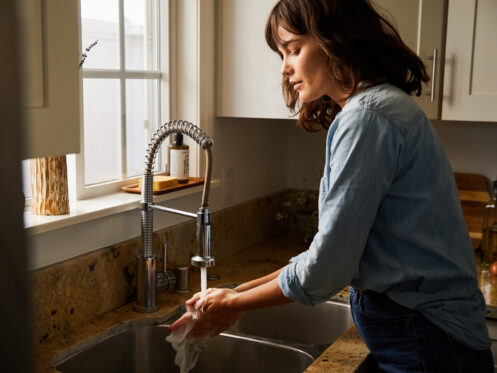Summer heat can wreak havoc on your plumbing! With everyone showering more, watering lawns and gardens, and maybe even filling a pool, water usage skyrockets. This extra pressure can expose weaknesses in your plumbing, and this can lead to leaks, bursts, and major headaches. The key is to be proactive. Getting your plumbing checked before summer hits can prevent these costly and inconvenient problems. It’s much better to avoid a plumbing nightmare when temperatures soar.
Inspecting and Maintaining Outdoor Faucets
Summer’s a blast, but it can be tough on your outdoor faucets! All that gardening, pool filling, and car washing can wear them down faster. To keep those spigots spick and span, Turn on each faucet and check for drips. A leaky faucet wastes water and can even damage your foundation. If you notice a drip, fix it. Most leaks can be fixed by replacing a washer or seal. Additionally, make sure the hose connection is secure and the faucet handle turns smoothly.
Preventing Hose Bib Damage
Don’t forget about your hose bibs. These are the outdoor spigots that take a beating all summer from connecting and disconnecting hoses. All that wear and tear can lead to leaks and even burst pipes. This nifty device stops water from flowing backwards and puts less stress on the bib. Also, store your hose correctly. Hang it up on a reel or hanger to avoid kinks and tangles that put extra strain on the connection. By following these tips, you’ll save yourself from leaks and ensure your hose bibs are ready to tackle any summer watering job.
Managing Increased Water Usage
The additional water usage that comes with summertime activities can put a strain on your plumbing system. Consider installing low-flow showerheads and faucets to control this. These fittings save water without compromising efficiency. Another piece of advice is to watch how much water you use. Try watering your garden first thing in the morning or make it the last thing that you do at night to prevent water from evaporating too quickly. Moreover, a pool cover can cut down on water loss due to evaporation, which means you won’t have to replenish your pool as often. Your plumbing system and your utility bills will both benefit from your water conservation efforts.
Checking for Leaks and Drips
Drips and leaks are inefficient and, if left unchecked, can cause serious harm. Checking for leaks in your plumbing system becomes even more critical in the summer. Find any signs of dampness or discoloration by beginning your search under sinks, around toilets, and at the base of cabinetry. If you see a sudden spike in your water bill, it may be a sign of a concealed leak. Quickly have a plumber replace worn-out parts or tighten connections if you notice any are loose. If you suspect that a more severe problem, such as pipe corrosion or excessive water pressure, is to blame for your leak, it’s wise to call a plumber.
Maintaining Your Water Heater
In the summer, when hot water is in high demand for activities like washing dishes, clothes, and taking showers, your water heater must work harder to keep up. To keep it functioning well and prolong its life, routine maintenance is necessary. To eliminate sediment buildup, have a plumber flush the tank. The heater will have to work harder than required because of sediment, which can increase energy costs and reduce its longevity. It’s also wise to have a plumber check the anode rod to keep the tank from corroding. If it’s half-worn or more, replace it. Do not forget to double-check that your water heater is set to the appropriate temperature. Most of the time, keeping it at 120° Fahrenheit is enough to avoid scalding burns and save electricity.
Preventing Pipe Sweating
Drips and other water damage can result from pipe sweating, which happens when moisture condenses on pipes that carry cold water. This usually happens in the summer because of the high humidity. To keep your pipes warm and protected from this, you can use foam pipe insulation. In addition to keeping perspiration at bay, this also keeps water in the pipes at a consistent temperature, which cuts down on heating expenses. Another way to control humidity is to keep the inside temperature constant and use dehumidifiers. Make it a habit to check for drips and leaks and fix any insulating gaps as soon as you notice them.
Working within a budget? Apply for financing online or call (866) 898-0007 to learn more!
Avoiding Sewer Line Backups
Because of the higher water demand and more frequent heavy rains in the summer, sewer system backups are more likely and can cause a lot of damage. Fortunately, there is a lot you can do to prevent sewer line problems. Never flush non-biodegradable materials down the toilet, including coffee grounds, grease, and other similar substances. If you want to keep your sewer lines clear of tree roots and other debris that can clog them, you should have a professional inspect and clean them every few years. Installing a backwater valve is another way to keep sewage from backing up into your house.
Ensuring Proper Irrigation System Functioning
For summertime lawn and garden maintenance, an effective irrigation system is a must. Make sure there are no leaks, obstructions, or broken sprinkler heads by checking your system frequently. To avoid water waste on driveways and sidewalks, adjust the sprinkler heads so that they water only the designated areas. Make sure the timer settings are in line with the water use limits and the best times to water your plants in your area. Another option is to install a smart irrigation system that can detect changes in the weather and soil moisture levels and adjust watering accordingly.
Addressing Water Pressure Issues
Summer is a common time for water pressure problems because of the higher water use. Problems with the city water supply, clogged pipes, or leaks can all lead to low water pressure. First things first, make sure the pressure regulator is in good working order; it might need adjusting or replacing. Check for pipe and fixture leaks and remove mineral buildup from faucet aerators and showerheads. You might have to call a professional plumber to assess the situation if the problem continues. By maintaining the correct level of water pressure, you can keep your plumbing system running smoothly and avoid putting undue stress on your appliances and fixtures.
Scheduling Professional Plumbing Inspections
Having a skilled plumber check your plumbing system on a regular basis is important for its health, but it is especially important in the summer. If you hire a plumber, they can see problems early on and fix them before they escalate. As part of a comprehensive assessment, a plumber will look for corrosion, leaks, low water pressure, and other problems with your plumbing fixtures and appliances. They can also suggest improvements and maintenance to increase efficiency and prevent future issues.
Delta Mechanical is here to help with all your plumbing needs in Phoenix, AZ. We offer leak detection, water treatment, repiping, water heater installations (including tankless models), and much more. Call us now to schedule plumbing maintenance for your home.
Be sure to check out our online specials, too!


